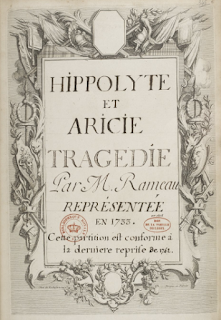Massenet - Cendrillon
Opéra Comique, Paris, Wednesday March 9 2011
Conductor: Marc Minkowski. Production: Benjamin Lazar. Choreography: Cécile Roussat and Julien Lubeck. Sets: Adeline Caron. Costumes: Alain Blanchot. Lighting: Christophe Naillet. Cendrillon: Judith Gauthier. Le Prince charmant: Michèle Losier. La Fée: Église Gutiérrez. Mme de La Haltière: Ewa Podleś. Pandolfe: Laurent Alvaro. Noémie: Aurélia Legay. Dorothée: Salomé Haller. Le Roi: Laurent Herbaut. Le Doyen de la Faculté: Vincent de Rooster. Le Surintendant des plaisirs: Julien Neyer. Le Premier Ministre: Paul-Henri Vila. Orchestra and Chorus of the Musiciens du Louvre – Grenoble.
I remember once reading (you can probably tell me where) that Strauss’s operas were “luxury” works requiring “luxury” performers to succeed. I think the same can be said of Massenet. There’s a potential for outdated mawkishness in the texts (think: “Adieu notre petite table” – or in this particular case, Cinderella reminiscing tearfully about an armchair) and for trashiness in the music that’s best avoided by having a top-flight orchestra and cast. You don’t schedule Esclarmonde if you haven’t got a Sutherland, you don’t schedule Thäis if you haven’t got a Sills, and you don’t do Massenet at the local high school.
So always some misgivings with Massenet… But musically we got off to a good start the other evening. Minkowski and his band naturally brought briskness and bite to the opening bars and it was clear from the outset that the staging was going to be lively and fully theatrical.
Laurent Alvaro, though I believe a last-minute stand-in, was at his best (why are some critics so unkind about him?); and I might add at this point that the only redeeming feature of the scandalously overpriced “baignoire” I was in at the rear of the orchestra was the extraordinary acoustics: the voices were so present as to be almost embarrassingly intimate and exposed, so any flaws would have shown up immediately. There weren’t any, and the father and daughters raised hopes of an evening of strong, team singing. And then of course we had the bustling entry of the wonderful Ewa Podles. The voice is now diminished but still unmistakably hers: butch and chesty and under thoroughly professional control. And of course she’s a bête de scène and hammed it up a treat as the harridan in giant leg-of-mutton sleeves and extravagant feather head-dresses (a feature of this production: the production team must have eaten pheasant for weeks on end). Prince Charming was very fine.
Stiff in a jewel-ecrusted art nouveau dress straight out of a period poster, Eglise Gutiérrez was rather a cautious fairy, not quite the “French coloratura” vocal type the part seemed to be written for. It might have been better to bring in a Russian singer used to Rimsky-Korsakov. But still, though lacking in projection and personality, she had the crystalline top notes. Of course, she came on after Cendrillon but I’m saving the great disappointment of the evening for last: Judith Gauthier. Over the past few days I’ve been wondering quite how to describe my impressions without risking a libel suit. I’ll start with something I wrote to a friend on Facebook: “She sings like an amateur. An amateur with a few unexpectedly high notes but who needs a great deal of training before she can go on stage. If ever she can go on stage, because clearly she has not an ounce of theatrical sense in her.” Nearly all the best, lushest or most magical moments in Massenet’s score involve Cendrillon: Cendrillon with the prince, Cendrillon with her father, Cendrillon with the fairy. All were ruined. I couldn’t believe my ears. When I read, in Opéra Magazine, that “Judith Gauthier ne pensait aucunement à une carrière de chanteuse,” I think “she was dead right.” When I see that three months ago she was singing Frasquita in Bonn, I wonder why on earth she’s now singing Cendrillon in Paris. The parti-pris of the production may have been to play Cendrillon as a frail, fragile creature: she was often in a nightgown on a cot. But to me, not only does the score call for more charisma, but Judith Gauthier should not even be singing professionally; she ruined the evening. Even I found myself longing for Renée Fleming, which surely goes to show…
The production, lively and highly theatrical as I said above, blended grand siècle and belle époque with abandon. As I understand it, Cendrillon was the work with which the burnt-out Opéra Comique rose again from its ashes in 1899, complete with electric lighting, and the director took his cue from that, mixing colourful costumes that looked very like a 50s Comédie Française take on Louis XIV, exaggeratedly peaked periwigs, the aforementioned feather headdresses and stylised gestures, with turn-of-the-century technical innovations, very early films of French music hall projected magically on a column of smoke, not one Loïe Fuller but two, lit from beneath, and above all “la fée électricité” as she was called: the magic of electric lights. The set was essentially black; a black-framed glasshouse, sometimes with black-and-white print cut-outs of furniture, chimneypieces and mirrors, sometimes with ladders or spiral stairs wheeled in, sometimes with chandeliers, and so on, all forming a black backdrop for lighting effects: little “will-o'-the-wisp” bulbs on the ends of springy wires attached to the dancers, the magic tree outlined in fairy lights, stars descending from the skies, Cinderella’s electric ball gown… The acting was a bit OTT for me, a bit too silly and slapstick (highlighting Cendrillon’s contrasting droopiness) but tightly managed and thoroughly rehearsed.
Maybe the other (mezzo) Cendrillon cast in this run is better. In which case, if there’s a DVD of this otherwise fine show, let’s hope it will be with her.



Comments
Post a Comment